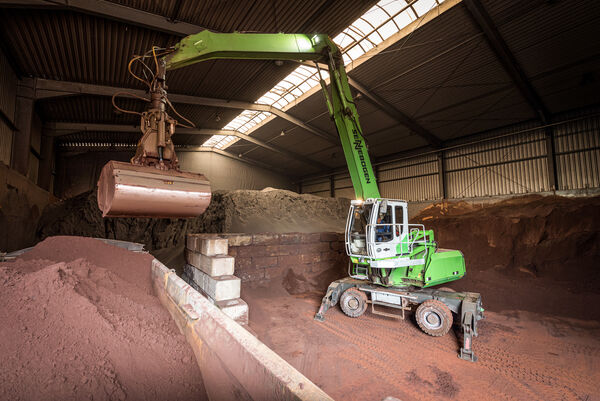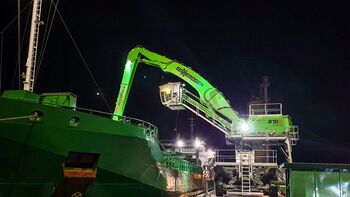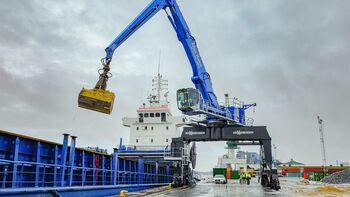Efficient bulk handling with SENNEBOGEN electric material handler 860 E Hybrid
Since 2002, Gesellschaft für Umweltdienste mbH successfully manages its business in one of the most important inland ports in Europe: the tasks of the company in the port of Duisburg, Germany, with 30 employees, go far beyond those of a classic cargo handling company. They have discovered another market for themselves by renting out material handling machinery, including personnel, in order to thus utilize their machine capacity in the best possible way. In 2019 and 2020, the Duisburg-based company also redesigned its 800-meter quay, as they will now operate two SENNEBOGEN 860 E Hybrid electric material handlers with 250 kW engines there. With a peak handling capacity of up to 800 t per hour, the company proves that electric material handlers are just as powerful as their diesel counterparts: And, as a result, the loading and unloading of ships with bulk materials is low-maintenance, effortless, and at the same time highly efficient.
Electric mobility in material handling
Electric mobility in material handling - it comes in many forms and offers great potential for savings. Andreas Frye, Managing Director of Gesellschaft für Umweltdienste mbH (GUD in short) in the port of Duisburg, now uses two electrically powered SENNEBOGEN 860 E Hybrid material handlers on the quay and reports: "No oil changes, fewer components compared to the diesel version and thus less maintenance required. So the calculation was simple for us: the 860 E electric material handler is always ready for use and, on top of that, reduces our operating costs by 50%."
The Duisburg-based company has already gained a lot of experience with electric machines and SENNEBOGEN material handlers, and counts several green machines on its premises: among others, an older, electrically powered 870 of the C series has been running trouble-free for 12 years, with over 20,000 operating hours on the meter. But there was further potential for electrification directly on the quay: "A continuous, cable-connected power supply over 800 meters of quay length was difficult to implement, because disconnecting from the power source would be unavoidable at such a distance. The ideal solution for us was to place an additional connection point every 40 to 50 meters. Up to the next power source, the 860 itself pulls a diesel generator, which allows the short distance to be mastered perfectly."

manageable technology and not packed with unnecessary electronics
Another material handler has been reliably in operation at GUD for many years: An 825 of the D series from 2016 takes over the intermediate storing of iron oxide in a hall. It now also has 7,000 operating hours on the meter and performs its tasks reliably and quickly. Andreas Frye goes on to explain how important manageable technology and proximity to his business partners are to him: "We enjoy the excellent service provided by our partner BRR in every respect, and the close relationship with SENNEBOGEN is also important to us. The machines always offer state-of-the-art technology and are not packed with unnecessary electronics: this also means that we can do some service work ourselves. As a result, we manage to keep machine uptime permanently high."
Port handling and rental business
Cargo handling companies like GUD in Duisburg work hard and need specialized machinery to cope with the variety of materials in ports. Every year, approximately 250 ships with a capacity of between 1,000 and 5,000 t dock at this Duisburg quay. In total, around 500,000 tons of material are moved each year, most of which is bulk cargo. In addition to classic bulk handling, GUD also specializes in the rental business: "In order to make the best possible use of our machines, we provide some of our SENNEBOGEN material handlers for use on construction sites or in other ports. Linked to this is our personnel service, because our operators, with their know-how in the rental portfolio, are also more in demand than ever - a clear unique selling point, especially in times of a shortage of skilled labor."
Press images
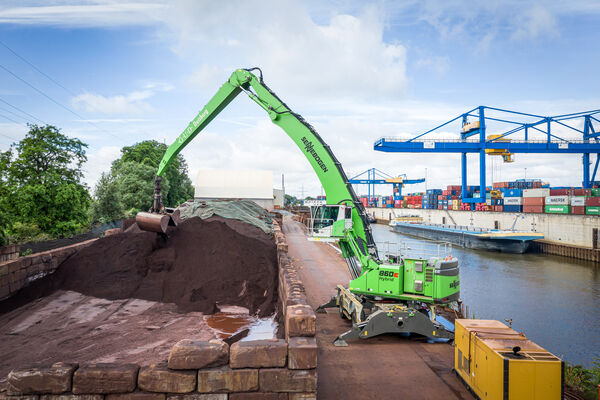
Press images
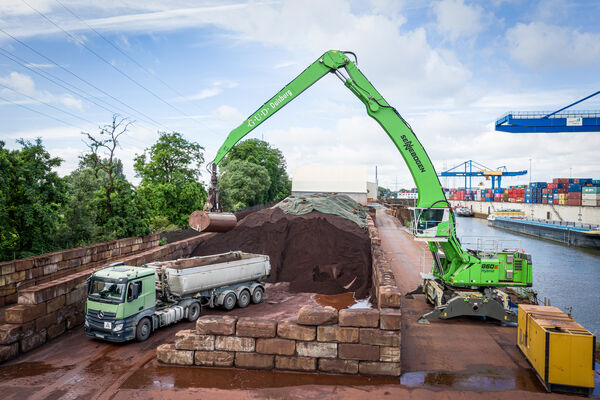
Press images
